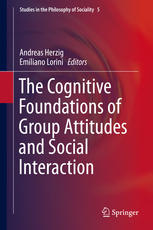

Most ebook files are in PDF format, so you can easily read them using various software such as Foxit Reader or directly on the Google Chrome browser.
Some ebook files are released by publishers in other formats such as .awz, .mobi, .epub, .fb2, etc. You may need to install specific software to read these formats on mobile/PC, such as Calibre.
Please read the tutorial at this link: https://ebookbell.com/faq
We offer FREE conversion to the popular formats you request; however, this may take some time. Therefore, right after payment, please email us, and we will try to provide the service as quickly as possible.
For some exceptional file formats or broken links (if any), please refrain from opening any disputes. Instead, email us first, and we will try to assist within a maximum of 6 hours.
EbookBell Team

4.7
56 reviewsThis book offers a widely interdisciplinary approach to investigating important questions surrounding the cognitive foundations of group attitudes and social interaction. The volume tackles issues such as the relationship between individual and group attitudes, the cognitive bases of group identity and group identification and the link between emotions and individual attitudes.
This volume delves into the links between individual attitudes (such as beliefs, goals and intentions) and how they are reflected in shared attitudes where common belief, collective acceptance, joint intentions, and group preferences come into play. It pursues answers to the connections between trust and beliefs, goals and intentions and attempts to investigate questions such as: does trust have an affective component and how it may relate to hope and fear? The volume also scrutinizes game theory and questions whether it can satisfactorily explain and model social interaction and if there may be any concepts which are not addressed by the current theory.
Contributors are derived from disciplines including philosophy, economics, psychology, logic and computer science. Interdisciplinary in scope and comprehensive detail, this volume integrates a variety of approaches – philosophical, psychological and artificial intelligence – to strategic, normative and emotional aspects of social interaction.